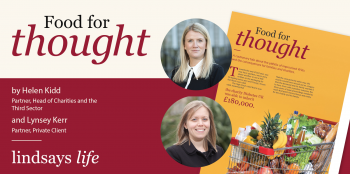The Succession (Scotland) Act 2016 updates the law concerning how a person’s property passes on death.
A number of the main provisions come in to force on 1 November 2016 and although they may not require you rushing to amend your Will, it is worth noting how the changes affect how your estate is distributed when you die, without you making any change to your current Will.
What happens to your Will if your relationship ends?
If you die on or after 1 November 2016 and your Will leaves all or part of your estate to an ex-spouse or ex-civil partner, such a legacy is treated as if it had been revoked when the relationship legally ended. If they are appointed as an executor or guardian, such appointments would no longer be valid following a divorce or dissolution.
If you do wish your ex-spouse or ex-civil partner to be a beneficiary or be appointed as an executor or guardian, you would have to explicitly state this in your Will. If you think this would apply to your circumstances, it would be a good idea to review your Will.
What happens to your Title Deeds if your relationship ends?
Often, where property in Scotland is held by two or more people (commonly spouses or civil partners), the title deeds contain a “survivorship destination”. This means that on the first death, the title automatically passes to the second person, notwithstanding the terms of the Will.
However, the new Act states that such a survivorship destination will fall when a relationship formally ends - that is if you get divorced, your Civil Partnership is dissolved or your Marriage is annulled. Again, if you did not want such a provision to apply, you would need to clarify the position in your Will.
What happens if there is a mistake in a Will?
The new Act now allows an application to be made to Court to have a Will rectified where there is a simple or obvious error. There are strict timescales to be adhered to and conditions to be met but this is a significant change. Until now, it has not been possible to amend a Will which contains errors after someone has died.
Changes to the treatment of parties dying simultaneously
The old rules stated that where spouses or civil partners died simultaneously, it was presumed that neither survived the other. In any other case, if two people, who were not spouses or civil partners, died together it was presumed that the younger survived the elder.
The new Act replaces these rules and states that, in all cases, where two people die simultaneously, whether spouses, civil partners or otherwise, neither is treated as having survived the other.
Where can you find more information?
This is just an insight into some of the more relevant changes which come in to effect from today. There are other amendments concerning protection for trustees and executors; revival of revoked Wills; Liferent Trusts and other Trusts.
You can find more information here:- http://www.gov.scot/Topics/Justice/law/damages/succession or http://www.parliament.scot/parliamentarybusiness/Bills/90123.aspx
Our Private Client team is experienced in writing Wills and winding up estates and would be happy to advise on the impact of this new legislation. Please contact a member of our team if you have any questions.
Key terminology
- Estate – property and possessions belonging to a deceased person.
- Beneficiary – the people or organisations entitled to benefit from a deceased person’s estate.
- Legacy – a gift of property or cash made under a Will.
- Executor – a person appointed to administer a deceased person’s estate.
- The Act or the new Act – Succession (Scotland) Act 2016





















